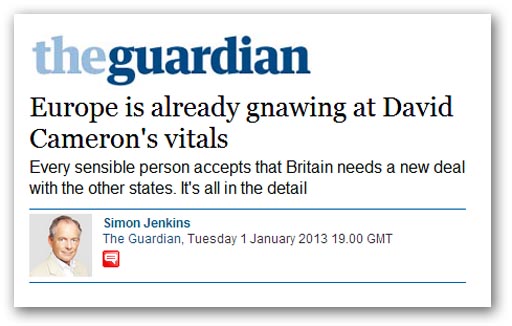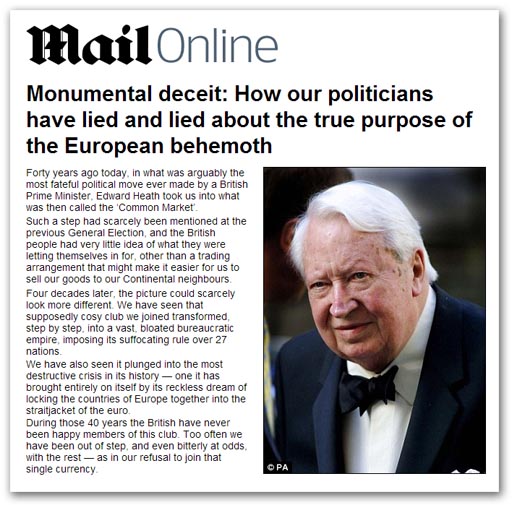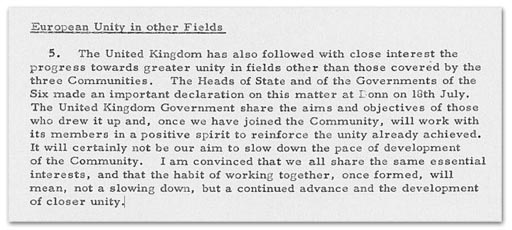EU politics: missing the detail
Wednesday 2 January 2013
Belatedly, Simon Jenkins is joining the fray with a flowery contribution which boils down to the simple premises that: "There is no alternative to some renegotiation of Britain's relations with the rest of the EU". Jenkins gets to his lofty position after wishing a plague on everyone's house, from the federalists to the likes of UKIP, for which he has very little time. Britain will never "leave Europe", he says, any more than it did in the times of Marlborough, Pitt and Churchill. The only question is the oldest in the history book: how best can Britain live in political and commercial harmony with other European states? That much we would agree with, and have been saying for a long time that the essential requirement is for us to redefine our relationships with the EU member states. But, if we can't leave "Europe", we can leave the European Union, and it is this that is the centrepiece of the argument. Effectively, what we are saying – and have been for time immemorial – is that it is not, and never has been, necessary to order our relationships with European states by being a member of the system of government known as the European Union. And there, Jenkins does not so much fall off the rails so much as go screaming round the bend at top speed and, without slackening an iota, he smashes into the buffers of terminological inexactitude. Not once in his thousand-word piece does he use the phrase "European Union". One can thus admire his beautifully crafted English, and his profound historical knowledge, except that his essay is like a fine porcelain teapot, with no spout and no handle. One thus has to ask: "what is it for"? The debate, he says, "is at last real, and thus exciting". But, he says, "calls for a referendum on 'Britain in or out' are absurd". It would, he says, produce closure just when openness is most welcome. "A means must be found to sustain free and fair trade in Europe as a whole without so infringing national sovereignty that electorates will not stand for it". And it is that which has Jenkins smashing into the buffers. The debate "requires the tribes to talk, not shout", he says - by which means he decides that there is no alternative to some renegotiation of Britain's relations with the rest of the EU. He then adds: The eurozone demands it. The leakage of billions of euros into European tax havens must be stopped. The Brussels thesis that corruption is not a single market issue must be punctured. Energy resources must be shared. This is not a matter of idiot metaphors about "premier league and fast tracks". It is a simple necessity.Had Mr Jenkins dwelt on a few plain words, he would known he was talking nonsense. Calls for an "in-out" referendum are not at all "absurd" if one is talking about getting out of the European Union rather than leaving "Europe". Furthermore, Mr Jenkins has not addressed the issue of Article 50, by which the UK would have to notify the Council of its intention to leave before negotiations could start. Yet through this article is the best way of redefining our relationships with the EU member states, so remaining engaged with "Europe". If you start off with the wrong premise, though,your conclusions most likely will be faulty. And so it is with poor Mr Jenkins. He tells us: "Every sensible person accepts that Britain needs a new deal with the other states of Europe, one that leaves the words 'in and out' to fools". Fools they might be to believe they can win an in-out referendum at this juncture, but that is any story. But the fact is that before we can fully engage with "Europe", we need to leave the European Union. Then to use Mr Jenkins's precise words: "Everything is in the detail. Only when we see that detail can the conversation begin". The trouble is, Mr Jenkins doesn't do detail – and neither do most of his media colleagues. And that is why, for all their fine worlds, and clever language, they always get it wrong. COMMENT THREAD Richard North 02/01/2013 |
EU politics: monumental deceit
Tuesday 1 January 2013
The piece serves to remind us that entry was perpetrated on the basis of structured deceit, with successive prime ministers (Macmillan and Heath) actively lying as to their broad intentions and the proposed relationship with the Six. As Booker writes: "As we see from Cabinet papers and other documents of the early Sixties, Prime Minister Harold Macmillan and his 'Europe Minister' Edward Heath were put completely in the picture about the secret 'grand plan'. But in June 1961 the Cabinet formally agreed that it must not be revealed to the British people". In Macmillan's words, to admit "the political objectives" of the Rome Treaty would raise "problems of public relations" so "considerable" that they should be kept under wraps. It was vital to emphasise only the economic advantages of British entry. Those utter fools who assert that the relationship was primarily economic (and has since gone off the rails) need to read the Cabinet Memorandum of 21 June 962, (originally referenced C. (61) 84 and now CAB/129/105), in which Macmillan set out the purpose of seeking full United Kingdom membership of the European Economic Community, as "… the only effective way of securing our political objectives in the world, and of averting the dangers of continued division in Europe". Then, in a note to his Cabinet colleagues on 10 October 1961 (Originally C.(61)162, now: CAB/129/107 - see above), Edward Heath asserted that the UK had been following closely the progress towards unity in fields other than those covered by the three communities. He conveyed to his colleagues that it was the intention of the UK to work with the Six "in a positive spirit to reinforce the unity already achieved". Heath was "convinced" that the UK and the Six "share the same essential interests", and that "the habit of working together, once formed, will mean, not a slowing down, but a continued advance and the development of closer unity". From the very start, therefore, it was evident that Heath intended to take the UK into the EEC with a view to developing further political unity. The economic issues were always camouflage, and the label "Common Market" was simply a ploy deliberately to obscure the real intent. Cameron and modern-day politicians are now paying the price for that deceit, having to deal with a relationship founded on a bed of lies and poisoned by the continuing deception. Such a situation is irrecoverable, which means there can only be one resolution – our withdrawal from the European Union. Simply, a relationship built on lies can never prosper, and can never be repaired. We need to start again to avoid what Thatcher called "the greatest folly of the modern era". And the first step starts with the admission that the EU and its precursors were never economic alliances. The economic aspects were always a means to an end, designed to secure political unity, something which has been foisted upon us by deceit, and of which we want no part. COMMENT THREAD Richard North 01/01/2013 |
Wednesday, 2 January 2013
Posted by
Britannia Radio
at
06:58
![]()

























